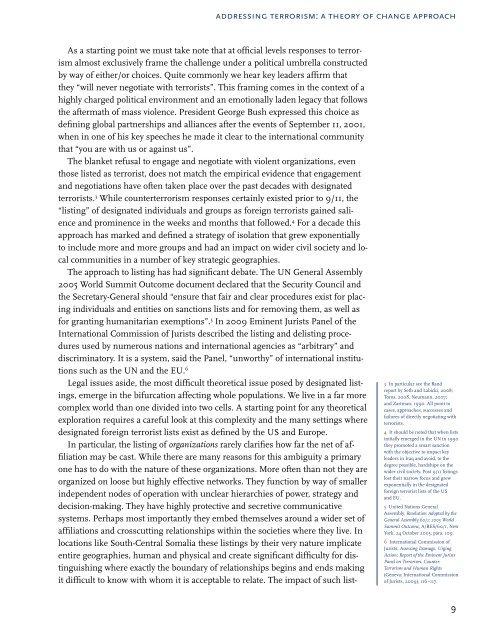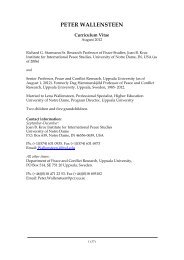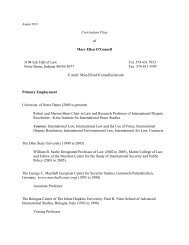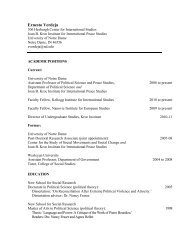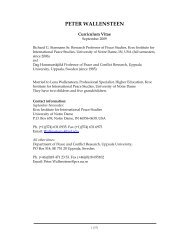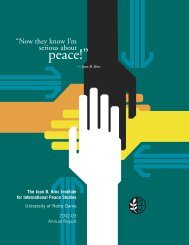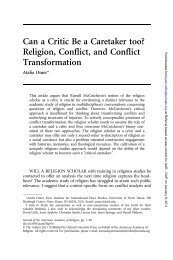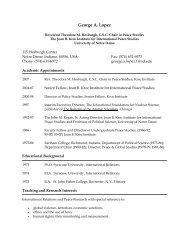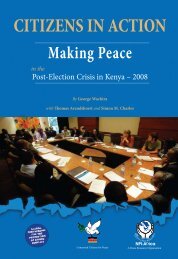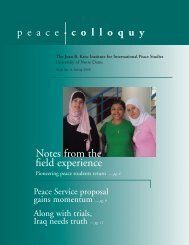Somalia: Creating Space for Fresh Approaches to Peacebuilding
Somalia: Creating Space for Fresh Approaches to Peacebuilding
Somalia: Creating Space for Fresh Approaches to Peacebuilding
You also want an ePaper? Increase the reach of your titles
YUMPU automatically turns print PDFs into web optimized ePapers that Google loves.
addressing terrorism: a theory of change approach<br />
As a starting point we must take note that at official levels responses <strong>to</strong> terrorism<br />
almost exclusively frame the challenge under a political umbrella constructed<br />
by way of either/or choices. Quite commonly we hear key leaders affirm that<br />
they “will never negotiate with terrorists”. This framing comes in the context of a<br />
highly charged political environment and an emotionally laden legacy that follows<br />
the aftermath of mass violence. President George Bush expressed this choice as<br />
defining global partnerships and alliances after the events of September 11, 2001,<br />
when in one of his key speeches he made it clear <strong>to</strong> the international community<br />
that “you are with us or against us”.<br />
The blanket refusal <strong>to</strong> engage and negotiate with violent organizations, even<br />
those listed as terrorist, does not match the empirical evidence that engagement<br />
and negotiations have often taken place over the past decades with designated<br />
terrorists. 3 While counterterrorism responses certainly existed prior <strong>to</strong> 9/11, the<br />
“listing” of designated individuals and groups as <strong>for</strong>eign terrorists gained salience<br />
and prominence in the weeks and months that followed. 4 For a decade this<br />
approach has marked and defined a strategy of isolation that grew exponentially<br />
<strong>to</strong> include more and more groups and had an impact on wider civil society and local<br />
communities in a number of key strategic geographies.<br />
The approach <strong>to</strong> listing has had significant debate. The UN General Assembly<br />
2005 World Summit Outcome document declared that the Security Council and<br />
the Secretary-General should “ensure that fair and clear procedures exist <strong>for</strong> placing<br />
individuals and entities on sanctions lists and <strong>for</strong> removing them, as well as<br />
<strong>for</strong> granting humanitarian exemptions”. 5 In 2009 Eminent Jurists Panel of the<br />
International Commission of Jurists described the listing and delisting procedures<br />
used by numerous nations and international agencies as “arbitrary” and<br />
discrimina<strong>to</strong>ry. It is a system, said the Panel, “unworthy” of international institutions<br />
such as the UN and the EU. 6<br />
Legal issues aside, the most difficult theoretical issue posed by designated listings,<br />
emerge in the bifurcation affecting whole populations. We live in a far more<br />
complex world than one divided in<strong>to</strong> two cells. A starting point <strong>for</strong> any theoretical<br />
exploration requires a careful look at this complexity and the many settings where<br />
designated <strong>for</strong>eign terrorist lists exist as defined by the US and Europe.<br />
In particular, the listing of organizations rarely clarifies how far the net of affiliation<br />
may be cast. While there are many reasons <strong>for</strong> this ambiguity a primary<br />
one has <strong>to</strong> do with the nature of these organizations. More often than not they are<br />
organized on loose but highly effective networks. They function by way of smaller<br />
independent nodes of operation with unclear hierarchies of power, strategy and<br />
decision-making. They have highly protective and secretive communicative<br />
systems. Perhaps most importantly they embed themselves around a wider set of<br />
affiliations and crosscutting relationships within the societies where they live. In<br />
locations like South-Central <strong>Somalia</strong> these listings by their very nature implicate<br />
entire geographies, human and physical and create significant difficulty <strong>for</strong> distinguishing<br />
where exactly the boundary of relationships begins and ends making<br />
it difficult <strong>to</strong> know with whom it is acceptable <strong>to</strong> relate. The impact of such list-<br />
3 In particular see the Rand<br />
report by Seth and Labicki, 2008;<br />
Toros, 2008, Neumann, 2007;<br />
and Zartman, 1990. All point <strong>to</strong><br />
cases, approaches, successes and<br />
failures of directly negotiating with<br />
terrorists.<br />
4 It should be noted that when lists<br />
initially emerged in the UN in 1990<br />
they promoted a smart sanction<br />
with the objective <strong>to</strong> impact key<br />
leaders in Iraq and avoid, <strong>to</strong> the<br />
degree possible, hardships on the<br />
wider civil society. Post 9/11 listings<br />
lost their narrow focus and grew<br />
exponentially in the designated<br />
<strong>for</strong>eign terrorist lists of the US<br />
and EU.<br />
5 United Nations General<br />
Assembly, Resolution Adopted by the<br />
General Assembly 60/1: 2005 World<br />
Summit Outcome, A/RES/60/1, New<br />
York, 24 Oc<strong>to</strong>ber 2005, para. 109.<br />
6 International Commission of<br />
Jurists, Assessing Damage, Urging<br />
Action: Report of the Eminent Jurists<br />
Panel on Terrorism, Counter-<br />
Terrorism and Human Rights<br />
(Geneva: International Commission<br />
of Jurists, 2009), 116–117.<br />
9


